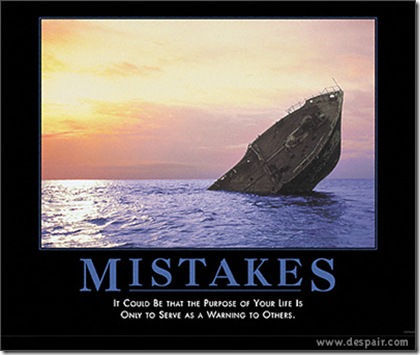As I seem to do at least once a week, I would like to point my readers over to a great discussion occurring at DrugMonkey. This time the topic is on paper authorship in the Biological/Biomedical Sciences. The main points of discussion circulate around PhysioProf's 5 authorship scenarios/issues: 1) collaboration between labs, 2) authorship for trainees, 3) to credit or not credit people who ran potentially influential but failed experiments, 4) should lab heads be given authorship for creating and maintaining the environment in which the research was conducted, 5) should someone who provides materials for the research be included as an author. As evidenced by the discussion at DrugMonkey, many of these are less than clear-cut issues.
I thought about discussing these issues from an ecological point of view where important differences in scientific culture and student funding could lead us to make different authorship decisions. I still think that would be interesting, but in preparing that I realized there was a fundamental question that had to be answered before I could meaningfully discuss more detailed scenarios. It is a shockingly basic question: what exactly is authorship of a paper meant to represent? We throw around phrases that sound like they define something (e.g., "meaningful contributions", "vouch for the validity of the research"), but the more I get into this crazy game the more unclear I become on just what those phrases mean.
Over the past coupe of decades, ecology has become immensely more collaborative and we frankly have been struggling with the concept of authorship as a result. In a very short period of time (I would guess 25 years at most) we have gone from primarily 1-2 authors per paper to these gargantuan authorlines generated by massive collaborative endeavors (for example, NCEAS working groups, LTER projects). It is easy to know who "should" be on an authorline when only two people are doing all the work, but when there are 20+ people, where does the line get drawn? Sometimes it seems that we've decided that anyone who breathes oxygen in the room while the research is being discussed deserves "credit". In addition to problems with trying to decide who should be on the authorline, how do you attribute credit to individuals? When it's just two blokes, (justly or not) you can feel pretty confident that those two people were intimately involved in most aspects of the research, but what does a 20+ authorline really signify?
In ecology, the large authorline is a reality that is more than just an artifact of NCEAS or the LTER network. Our science has been pushing across traditional boundaries with amazing boldness and speed. This results in research questions that may require skills in physiology and ecosystem ecology, or combining theoretical ecology with field ecology. The training required to master one of these areas is immense and in my experience people are very very rarely able to master more than one area. But what happens if you want to understand whether the presence and abundance of the Cane Toad, which is an invasive species, impacts ecosystem biogeochemical cycling and whether this has anything to do with the physiological phosphorus and nitrogen requirements of the toad? For one person to do this project well without collaboration would require someone with the knowledge and ability to conduct: field sampling and experimental manipulation of the focal organism, physiological knowledge of and perhaps lab experiments on the focal organism, sampling of nutrients in the field, and the lab analyses of those samples to actually get measurements of different forms of nitrogen or phosphorus, and the ability to interpret said results in the context of both the species' biology and the ecosystem biogeochemical cycles. A lab that is set up for the species or ecosystem end of the question is often not set up for the other. Odds are you are looking for someone to collaborate with, if only to get it all done in a reasonable amount of time. Once you get past one author, the question automatically becomes how many people "deserve" to also be an author.
I keep putting the word "deserve" in quotes because it is a word we all use but I honestly am not sure what it means. "Deserve" implies that there is some level of contribution to the research that automatically gives someone authorship rights, but you only have to look at the discussion occurring over at DrugMonkey to realize that none of us has any objective idea what that that level of contribution might be. In ecology, the changes in our science have been occurring so rapidly, that I feel like we've just grabbed authorship "solutions" from other disciplines, assuming that they've already thought this through. However, what I would like to see is some discussion regarding what the authorline is supposed to represent. What information do we want conveyed by the presence and ordering of the list of authors? Obviously, we use the authorline (for good or ill) to make some judgments about the research and the contributions of the people involved. But what information exactly are we trying to extract or convey with that? I feel that until there is a serious discussion about what exactly the authorline means in this collaborative age, we have little philosophical foundation for these discussions of authorship rules and etiquette.
So, what do what want to know from our authorlines? I'm hoping others will weigh in as I'm very curious about what other people think, but I'll get us started with a couple of my thoughts:
1) I want to know who the main point person on the project is. This is the person with the best grasp on the overall project and the research conducted within it. This is the person who is most likely to be able to answer a question about the research or to know exactly who did that component and why that technique was chosen (even if they did not do that analysis/experiment themselves and or even begin to explain how to do that technique).
2) If different people are responsible for different components of the research, I want to know who did what. Who's "credibility" is on the line if that component is wrong?
3) Did different people do different amounts of work for this project? If so, who conducted most of the work (this includes both the research and writing aspects)?
Most of what I want to know from an authorline is how to apportion credit and (frankly) gain a sense of how much I trust the results of the paper. Was this predominately the work of the known moron on the authorline or the brilliant scientist? (I know this last point is a little...something, but I'm really busy and I just don't have time to read all the papers I should be reading).
What about the rest of you? What information are you looking for from authorlines?





